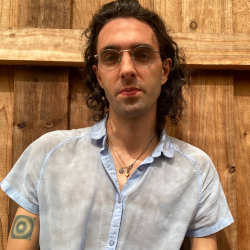Derek Baron is a Postdoctoral Associate at the Center for Cultural Analysis at Rutgers University-New Brunswick. They are a 2022-2023 Consortium Research Fellow.
From the late eighteenth to the mid-nineteenth century, American state and state-adjacent intellectuals sought anxiously to collect, extract, dissect, and taxonomize Indigenous North American languages in such a way that would be amenable to the forging of new mythologies of Euro-American manifest destiny and national futurity on North American soil. At the same time, the study of language in the United States—both amateur philology and nascent institutional linguistics—was eager to differentiate itself from European intellectual traditions and establish a properly “American” discourse. Against the predominantly text-based tradition of German classical philology, one of the most pressing practical needs was to develop methods of analyzing language by studying it in vivo, to transpose the unruly aural encounter with the speaking voice into a systematic method for the reproduction of unfamiliar sounds into text. The encounter with the speaking “other”—at once an ethnographic subject and a racialized political figure—became an ideologically overdetermined scene in the complex relationship between language sciences and settler-colonialism in North America.
My research project began from the simple question of what the sciences of speech and language had to do with the material processes of colonial and racial nation-building. The most beneficial aspect of my 2022-23 Research Fellowship from the Consortium for the History of Science, Technology and Medicine was that it exposed me to such a broad range of materials related to or adjacent to my stated topic that it ended up changing the purview of my research in general. In short, while I had originally framed this research in terms of a history of the “biopolitics” of language sciences in early America, my archives taught me that I could not engage with a question of “biopolitics” until I had grappled with the underlying “geopolitics” that produced the contested terrain in which such intellectual work took place. This shift is symbolized in a shift in my title since beginning this research in 2020: a dissertation project titled “The Biopolitics of Voice: Speech Sciences and the Articulation of Race in Nineteenth-Century America” has, through years of grappling with my archives, transformed into a book project entitled The Geopolitics of Voice: Sound, Listening, and Law in US Settler Colonialism.
One representative example of this shift comes from a document I encountered at the American Philosophical Society in Philadelphia as part of my Consortium Research Fellowship. An 1826 circular from Secretary of War James Barbour deputized government officials at various Indian Agencies to “collect” Indigenous languages and send back reports to Washington. While the project of comparative vocabulary would, the circular explained, offer “great facility in discovering the affinities” between Native nations, the study of grammatical structure would reveal “in what particulars they differ from the English, and other languages familiar to us.” Barbour urged government employees to exercise uniformity and consistency in the orthographic transcriptions of the sounds they heard. The ubiquitous anxiety over orthographic consistency reveals the tensions inherent to the colonial knowledge project: officials felt the need to capture Native speech in order to know the continent and narrate their place on it, but they were plagued by the knowledge that the sound reproduction technology of alphabetic writing was low fidelity and threatened the stability of their intellectual ambitions. Beyond general vocabularies and grammatical studies, Barbour also encouraged the collection of Native toponymy, especially the names of rivers, no doubt serving as valuable geopolitical intelligence in the westward military and diplomatic excursions during the era of Removal and Manifest Destiny.
As part of my Research Fellowship, I visited the American Philosophical Society, the Library Company of Philadelphia, the Newberry Library in Chicago, the New York Academy of Medicine, the Beinecke and Sterling libraries at Yale University, the Library of Congress, and the various special collections within the Smithsonian Institution. Each collection contained invaluable materials that both gave me new insight into my research questions and compelled me to shift the purview of those questions to better grapple with the intellectual, institutional, and political realities of the history I was examining. To give just a few examples among many: The Library Company of Philadelphia contained the manuscripts of James Rush, the mid-nineteenth century physician and son of Benjamin Rush. The LCP’s holdings of manuscript drafts for the latter Rush’s idiosyncratic Philosophy of the Human Voice (1827) were significant in showing the effort to establish a proper “science” of voice that would connect the various discourses within which it is made intelligible, including physiology, philology, psychology, and elocution.
At the Library of Congress, I worked in the archives of Henry Rowe Schoolcraft and Jane Johnston Schoolcraft (Bamewawagezhikaquay), a prominent couple in the Michigan territory in the early to mid-nineteenth century. Despite the historical credit usually being attributed to Henry, his wife Jane (from an important Ojibwe/Métis family in Bawateeg/Sault Ste. Marie) and her siblings were instrumental in the collection, translation, and publication of a wide range of Indigenous oral literature, including the narratives that would go on to inspire Henry Wadsworth Longfellow’s The Song of Hiawatha (1855). The history of literary collection in the “Old Northwest” is a prominent chapter in the American linguistic and literary imagination, and the personal papers of Jane Schoolcraft revealed a critical Indigenous perspective on what is typically narrated as a quest for Euro-American maturity and belonging.
The Research Fellowship from the Consortium provided an extraordinarily valuable range of archival sources with which to engage. Over the many months from the beginning of these archival visits to the completion of the fellowship, this range of sources helped reshape my research project itself, allowing me to grapple with not just the history of early American language sciences, but the contested worlds and conflictual meanings in which debates about the nature of language, speech, and voice take root.
|
